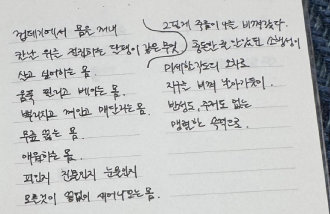`Regional Cooperation Official` Dispatch System
`Regional Cooperation Official` Dispatch System
Posted September. 19, 2003 23:29,
Is it a bridge between local and central administration or is just simply a system to monitor local government bodies in preparation for the coming general election.
Criticism over the `Regional Cooperation Official` Dispatch System (RCODS), which the Ministry of Government Administration and Home Affairs (MGAHA) implemented since August to build a smooth network between the central government and local autonomous entities, is escalating among local autonomous bodies.
Some local government bodies are strongly demanding immediate abolition of the MGAHA arguing, "The MGAHA intentionally exploits the RCODS by sending former state spy agents like supervisors to monitor dissidents and local bodies."
▽Raising Controversy over the Background of its Introduction = The idea behind its introduction was to ` reinforce cooperation between local and central government for a balanced national development and decentralization and to build a joint response system on national contentious issues.
The conflict, however, rose as the MGAHA sent a formal notice to each city hall and provincial office August 25 and instructed them to negotiate matters that require important approvals or budget requests with the regional cooperation official first and provide various information and materials to the officials upon request.
Gyeonggi Province Government Officials Association made a statement that demands abolition of the system and the Government Employees Union of Gyeongnam Province and the Employees Association of Ulsan also urged its abolition saying "It only amplifies our suspicions over its intent to monitor dissidents and local bodies and, thus, it is simply an out-dated authoritarian system."
Earlier to this, Gyeongnam Province rejected regional cooperation officials claiming, "The one-sided RCODS is rather to become hurdles of decentralization."
The biggest debate over the system is redundancy of work and government`s control over local government bodies.
Dissenters point out that the role of a cooperation official to analyse local public opinion on major government initiatives and services overlaps the services of media bureaus of each local city hall and provincial office revived August and reporting budget related matters through the official only adds another step of the reporting procedure.
Shim Jae Yong, a cooperation official of Pusan, was entangled in conflict late August as he was rebuked for demanding reference materials and public opinion trend reports on Gyeongbu High Speed Rail contruction and Shin Harbor construction by saying, "Show me the reports you submitted to the mayor," to a media bureau officer.
"Distorted information by cooperation officials can deepen the distrust between local and central government," one official of Cheju Province said.
Ambiguous duties of cooperation officials also raise questions. "The MGAHA has not much to gain by making cooperation officials analyze public opinion or difficulties of local government bodies. But rather, cooperation officials should focus their work on specific areas such as vitalization of local regions," said Kim Suk Jin, cooperation official of Gyeongbuk.
"Local bodies are over sensitive. How could one whole local government be controlled by the dispatch of one low ranking official," retorted Jeong Hyeon-gyue.
"The reinforcement of decentralization results in more national social conflicts in reality. So in the future, the cooperation officials will have much job to handle. Just give it more time to see how it goes," one official of the MGAHA said.




![“어깨 아프면 약-주사 찾기보다 스트레칭부터”[베스트 닥터의 베스트 건강법]](https://dimg.donga.com/c/138/175/90/1/wps/NEWS/IMAGE/2026/01/30/133269934.1.jpg)


